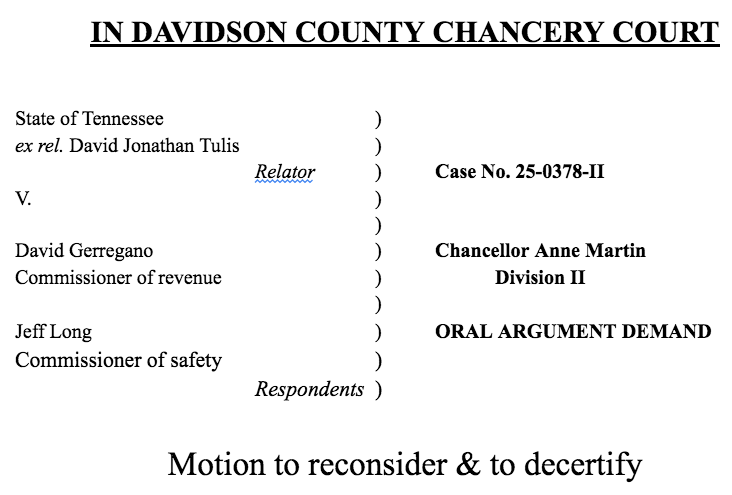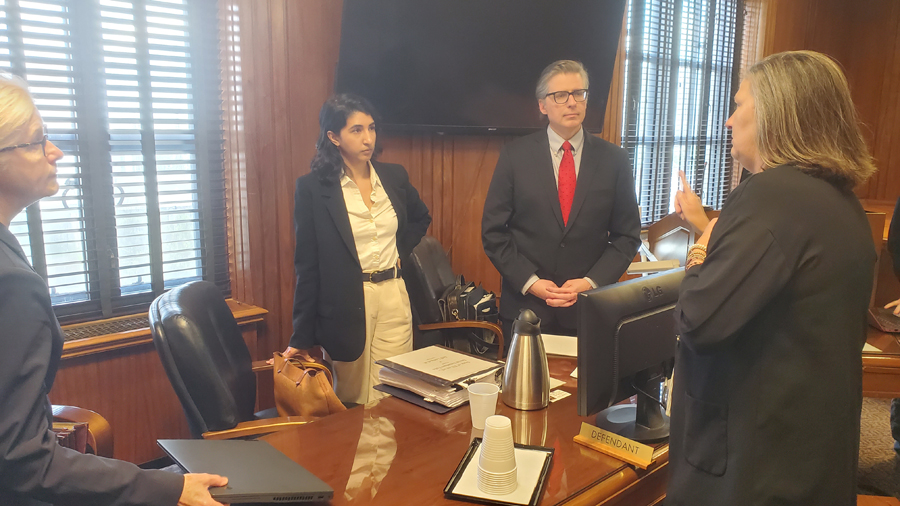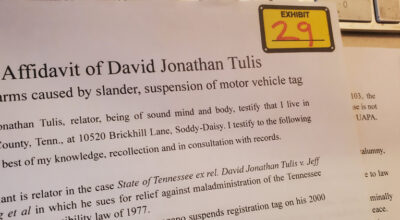CHATTANOOGA, Tenn., Saturday, April 12, 2025 — Rather than spending time working in the family garden today I spent my time drafting a motion to reconsider following a powerful hearing Thursday in Nashville. I believe this document is the most important I’ve yet filed in this battle against great malice and mischief in the departments serving Gov. Bill Lee.

And so it was that all who saw it said, “No such deed has been done or seen from the day that the children of Israel came up from the land of Egypt until this day. Consider it, confer, and speak up!”
— Judges 19:30
State of Tennessee on relation demands the court reconsider its denial of the motion for injunctive relief and to order respondent Gerregano to decertify the electronic insurance verification system (“EIVS”) on the following grounds.
- The system is required to be certified by the commissioner of revenue (“Mr. Gerregano,” “revenue” or “DOR”). T.C.A. § 55-12-212 (“The program shall be installed and fully operational upon certification by the commissioner of revenue that the program has been successfully tested and is ready for implementation *** . Until such certification occurs, no law enforcement action shall be taken based on the program”).
- Certification is the commissioner’s guarantee as to EIVS accuracy and reliability pursuant to T.C.A. § 55-12-101 et seq, Tennessee financial responsibility law of 1977 (“TFRL”) and T.C.A. § 55-12-201 et seq, James Lee Atwood Jr. Law (“Atwood”).
- Gerregano duties under Atwood are to “develop, implement, and administer an insurance verification program to electronically verify whether the financial responsibility requirements of this chapter have been met with a motor vehicle liability insurance policy” § 55-12-204 (emphasis added). Such policies create the SR-22, the certificate.
- A certificate is a ticket, warrant, “a written assurance, or official representation that some act has or has not been done, or some event occurred, or some legal formality been compiled with” Blacks’s Law Dictionary, Rev. 4th ed.
- Revenue duties in § 55-12-204 are to secure monitoring, for public health, safety and welfare, of the motor vehicle liability policy, defined at § 55-12-102.
- (7) “Motor vehicle liability policy” means an “owner’s policy” or “operator’s policy” of liability insurance, certified as provided in § 55-12-120 or § 55-12-121 as proof of financial responsibility, and issued, except as otherwise provided in § 55-12-121 by an insurance carrier duly licensed or admitted to transact business in this state, to or for the benefit of the person named therein as insured[.] (emphasis added)
- He admits he uses no filter on EIVS, that he creates a list of insurance industry noncustomers based on (1) his list of motor vehicle registrants and (2) insurance companies’ full books of business. He uses his list for sending notices under § 55-12-210.
- He admits not using department of safety’s division of financial responsibility, with its driver license records and SR-22 certificates.
- Respondent Gerregano admits EIVS does not “verify” the person insured under a motor vehicle liability policy per § 55-12-102(7). He admits he monitors, instead, other parties.
- He surveils the person who is (1) not required to buy a motor vehicle liability policy, (2) the person not required to maintain such policy “for the length of the license’s revocation or suspension” § 55-12-114, and (3) the person not a customer of State Farm or other carrier.
- He admits he surveils the person not under suspension and not having had a qualifying accident under § 55-12-104 and -105. That would be the person such as the one representing state of Tennessee in instant case.
- Relator is victim of the use of EIVS apart from its seal and certification. His 2000 Honda Odyssey minivan has been decertified for use as a motor vehicle, its authorization and registration yanked. Decertification of the car means it cannot be used for privilege taxable activity and must cease all such activity, and cannot be operated in that activity on the road.
- Such suspension of relator’s right to the privilege causes him two distinct injuries under “law enforcement action *** taken based on the program.” ➤ (1) He is denied the right to use the automobile for privilege taxable activity, carrying goods and people as a member of the “shipping public,” T.C.A. § 65-15-101(a)(3). ➤ (2) Relator is being denied its use for private purposes as a member of the “traveling *** public” at § 65-15-101(a)(3) apart from privilege, for convenience and necessity, for the enjoyment of constitutionally guaranteed rights (Tenn. Const. Art. I, religion, press, assembly), as respondents’ privies in law enforcement agencies forbid private use of automobiles under criminal sanction.

Attorney general lawyers, from left, are Mary McCullohs, Hollie Parrish and Nick Barca. A court reporter is at right. (Photo David Tulis)
Analysis
- Chancery court is at the heart of equity jurisprudence in Tennessee. It has authority to weigh equity claimed by respondents as against the equity claimed by state on relation as to the covenant between the people and their state, whether there is sufficient certainty to leave EIVS functions untouched and unadjusted under their certification in § 55-12-202.
- At the hearing the court is unwilling to act because it has not had time to read the law fully and a restraining order would unsettle an accepted status quo across a vast skein of interests.
- Without reversal, the court shares in Mr. Gerregano’s claims to absolute certainty, about his certification of EIVS. That means that the certification is true, complete and truthful, without one doubt, confirming EIVS verification of each motor vehicle liability policy is accurate. To deny, the court embraces the existing search calibration, holding any and all error as harmless.
- The court, thus, approves the certification as true even though EIVS is not used to verify motor vehicle liability policy as required in § 55-12-202.
IN A NUTSHELL ————————-
➤ Rogue program creates such a mess the EIVS surveillance system must be decertified
➤ Certification being ignored by safety, revenue
➤ Auto insurance mandatory only upon people adjudicated as high risk
➤ Treating every citizen as a lawbreaker is unconstitutional - Oral and written statements provided by respondents are not answers to the lawsuit’s allegations regarding the law. They are facial attacks upon relator sufficiency of process, standing and immunity, all of which under Tenn. R.Civ. Procedure admit the truth of his merits to avoid the suit.
- The lack of response to the merits of state of Tennessee’s case on relation are grounds for the court’s sense of uncertainty, its admitted unease, and for it to fulfill its duty under law and equity to decertify the program.
- Doubts and hesitations the complaint raises in the court’s mind should not be set aside just because the court has given insufficient attention to this case and admitted itself amazed at the law’s complexity, wordiness and history. The doubt in the court’s mind about EIVS actions upon the traveling public should be projected upon Mr. Gerregano, who by law is required to decertify the program if evidence, proof or facts arise to his notice as certifier of EIVS under § 55-12-202.
- The uncertainty and doubt about EIVS’ accuracy admitted by the court should be embodied in an order to decertify EIVS until a final order issues in this case.
- Forcing a private person to buy auto insurance is apart from law and abrogates constitutional liberty. State law doesn’t require purchase of insurance for speech, for living in a house, walking down public sidewalks, marriage or having children. No party apart from commercial enterprise privilege taxable activity is compelled to buy insurance.
- Relator rebuts the presumption that revenue has authority to revoke his registration when he is nowhere made liable by statute to obtain and maintain evidence or proof of financial responsibility, and if he hasn’t he does so here.
- If auto insurance is compulsory, Tennessee has executive branch legislation of organized crime. If insurance is voluntary, Tennessee has a marketplace serving those called a “free people,” Tenn. Const. Art. 1 § 24 (“That the sure and certain defense of a free people, is a well regulated militia”).
- EIVS use harms any person who has a right to travel without contracting with a state-licensed insurance carrier. No Tennessee court will lawfully uphold or enforce a contract entered under duress or coercion or fraud.
- The court is asked to take judicial notice that no part of ordinary life in Tennessee can be enjoyed or practiced apart from use of automobile or motor vehicle. Public transit is limited, distances are vast, and automobile-centric society requires use of roads thrown open for public travel. A person buys insurance for self-protection. To compel a person to buy a financial industry product apart from law hurts him who, for poverty or other reasons, forgoes that self-protection. The poor, such as relator under his affidavit in support of motion for injunction, p. 1, cannot justly be denied the right of equal access to public thoroughfares paid for by the taxpayer because he does not do business with State Farm, incorporated for private profit and gain.

Eagle Radio midstate bureau chief Christopher Sapp is a leading “gnome” in Tennessee, a legal scholar and researcher assisting in the “Eye of Sauron” fight launched in department of revenue July 26, 2023. (Photo David Tulis)
Argument
- Petitioner’s complaint and brief in support of injunction are an audit of DOR’s books, records and compliance under law. State on relation’s cause turns on the certification issue. DOR ignores certification and EIVS’ duty to verify a person’s motor vehicle liability policy. TFRL respondents’ double sets of books, exhibiting numerous contradictions between them, should not impress the court as to their veracity, equity or good faith.
- They argue, effectively, the difference between a certified and an uncertified auto policy is no more than the thickness of a piece of paper or an electron, or simply none.
- The difference, rather, is as great as east is from west, or north from south, or wheat from chaff, sheep from goat. The law makes distinction. Denial of distinction casts them into innumerable contradictions and confusion, evidenced in the complaint.
- Denying injunction declares to respondents and the world that certainty exists, that EIVS is sure, that its certification is true, that DOR does “verify whether the financial responsibility requirements of this chapter have been met with a motor vehicle liability insurance policy,” § 55-12-202, accurately — with no irregularity, with no harm to innocent parties such as relator.
- The ramifications of decertification upon 250 for-profit corporation members of the Tennessee automobile insurance plan under T.C.A. § 55-12-136, upon state departments, state policy or usages or upon 6 million motor vehicle registrants — whether good or bad — are outside the scope of chancery’s judicial authority.
- Consequences, if any, belong to respondents and the general assembly.
- The court should be concerned chiefly to uphold the justice in the Tennessee financial responsibility act of 1977, and to insist that it operate. Justice and equity obtain when a decertification order forces Mr. Gerregano to do what 20 months of petitioning in his department have failed to accomplish. Consider it. Confer. Read the law. Verify. Speak up.

Anne Martin is chancery court judge in Davidson County. I am appealing to her to rescind her denial of my motion for temporary restraining order against a powerful fraud operation involving two state departments in Nashville. (Photo Anne Martin election campaign)
- Relator alleges Mr. Gerregano is imposing great evil. To protect his honor, he deserves an order to decertify his certificate for EIVS, catch his breath and verify his program prior to certifying it once anew. He must needs read the law in pari materia. Remember from law school days law’s regularity to protect from arbitrary power, how the doctrine ejusdem generis, current today, forbids § 55-12-139(a) being construed as a full rewrite of the statute, an obliteration of financial responsibility in concept in exchange for mandatory insurance. “(a) This part shall apply to every vehicle subject to the registration and certificate of title provisions,” under the ordinary rules of construction, applies to parties already subject to TFRL under other provision. It does not create a universal obligation on all users of the road.
- Relator respectfully demands the court buckle down, clear its docket of lesser commitments and give full time required for this case. That millions await relief adds urgency to the matter of the law being made to work again, absent harm.
- Petitioner is not subject to the statute either through Part 1 or Part 2. He asks for personal and individual relief pending litigation. His having his two tags restored causes no loss to respondent DOR, causes no public safety threat and removes immediately irreparable harm threat of his being criminally charged by Mr. Long’s troopers or other respondent privies in use of his property. “The highways of the State belong to the people of the State” Dunlap v. Dixie Greyhound Lines, 178 Tenn. 532, 160 S.W.2d 413, 418 (1942).
- The extraordinary doubt and uncertainty cast upon EIVS in the verified complaint demands the court’s order to remove the claim of certainty against irregularity, as exhibited and heralded Jan. 1, 2017. The certification of that time under § 55-12-212 shows itself not certain, and today hereby clearly false.
Relief requested
- The law is the law, whether it affects 6 million Tennessee motor vehicle registrants or merely the 1 million poor such as relator who do not buy insurance and are subject to criminal prosecution in use of autos or motor vehicles.
- The court in allocation of its time and resources underrates the significance and urgency of relator’s petition. He demands the law receive the time and interest its claims are due, that since material, reasonable and verifiable doubts are raised against Mr. Gerregano’s § 55-12-212 certification of the motor vehicle liability policy verification program.
- Relator demands the court’s request from respondents’ attorneys for a draft denial order of his motion be rescinded, that his injunctive relief request be revised in the court’s mind and understood as follows, that:
- The commissioner of revenue decertify EIVS pursuant to § 55-12-212 pending his review of law.
- That DOR restore relator tags, fully paid for and current at time of suspension, on either or both of his automobiles so they might be useable as motor vehicles pending conclusion of the litigation to spare him the irreparable harm of criminal prosecution under attainder, general warrant or other custom known to control police powers in Hamilton and other counties.
- Respectfully requested, etc.

